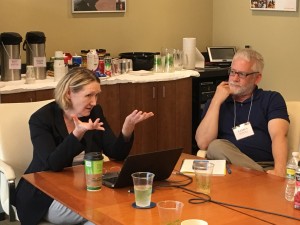The 11 university faculty from around the US all brought considerable background to water, sanitation, and health (WASH) issues. We come from around the US and were selected by CRS for an 11-day immersion into its approach to WASH in Ghana. We are professors and researchers in engineering, marketing, peace building, public health, environmental science, and more. But what we needed was a comprehensive overview of how CRS approaches WASH within a framework of integral human development.
We had the opportunity to spend a morning with CRS’s top water expert, Vanessa Tobin. Tobin came to CRS as senior technical advisor three years ago after a 24-year career working in the WASH sector at UNICEF. She laid out CRS’s new WASH strategy and current challenges for us. Her presentation helped us see how our individual focuses fit into the larger CRS strategy.
CRS is now placing increased attention on the environment and climate change in its new WASH strategy. The sector is now called Water, Environment, and Sanitation. Tobin explained why the sector now emphasizes the environment: “Climate change could profoundly alter future patterns of both water availability and use, thereby increasing global levels of water stress.”
She highlighted for us the principal challenges the world faces in the availability of clean water and the implications for health, agriculture, and full human thriving.
In addition to climate change, excessive use and poor management of water in agriculture are adding to the problem. The water table in some developing countries is dropping precipitously.
Add to that, contamination of water by fertilizer run-off and industrial waste, and it is readily apparent how precarious our world’s supply of clean, drinkable water is.
Water scarcity is increasing world-wide, but particularly in sub-Saharan Africa, and the burden of climate change is hitting poor communities hardest. “Currently, 1.6 billion people live in countries and regions with absolute water scarcity and the number is expected to rise to 2.8 billion people by 2025,” Tobin explained. That means that one third of the world could soon be suffering from water scarcity.
Tobin reinforced Pope Francis’s message in Laudato Si’, his encyclical on the environment, about the intimate connection of water to other factors basic to human dignity. Pope Francis wrote:
Access to safe drinkable water is a basic and universal human right, since it is essential to human survival and, as such, is a condition for the exercise of other human rights. (L.S. 30)
Tobin explained that CRS looks at the intimate connection of water to many of the key focuses it has around the world. Health, agriculture, and emergency response are the areas in which CRS stands out in the field of international development. Water, sanitation and hygiene strategies are integral to all three areas.
As we land today in Accra, Ghana, we will get the chance to visit sites where CRS supports the work of the local governments and local NGOs. We’ll get a chance to see effective and efficient supply of water. We’ll see how water and sanitation are key to success in school for children. And we’ll see how CRS is increasing the capacity of local leaders to educate the population in hygiene practices. These are just a few ways in which water and CRS’s WASH strategy emphasize an integrated and sustainable approach and not just a short-sighted supply approach.
Our morning at CRS headquarters helped us understand more clearly what Pope Francis means when he says that clean water is basic to integral human development:
Fresh drinking water is an issue of primary importance, since it is indispensable for human life and for supporting terrestrial and aquatic ecosystems. Sources of fresh water are necessary for health care, agriculture and industry. Water supplies used to be relatively constant, but now in many places demand exceeds the sustainable supply, with dramatic consequences for the short and long term. (L.S. 28)
For the rest of the week we’ll see how the parts must all fit together.

